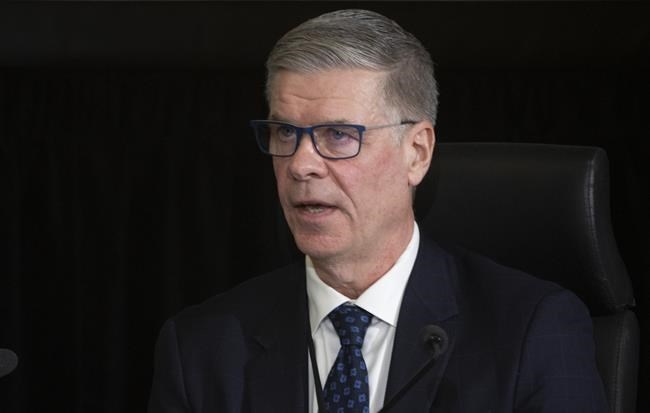OTTAWA — The former head of the Canada Border Services Agency was surprised to learn last winter that officers did not have the authority to stop would-be protesters from entering the country as demonstrations against COVID-19 restrictions were gaining momentum across Canada, he testified Wednesday.
CBSA started to see the first slow-roll protest past the border at the Emerson crossing in Manitoba on Jan. 17, John Ossowski told the inquiry investigating the federal government's use of the Emergencies Act, which was invoked in February after blockades of vehicles stopped traffic at border crossings and gridlocked downtown Ottawa.
Based on the intelligence gathered at the time, Ossowski said, the CBSA started putting contingency plans together for a potential blockade.
"One of the things that we started to do was — and very unusually — apply cameras facing back into Canada so that we could be aware of what was coming from behind," Ossowski testified Wednesday.
The border agency has lots of cameras facing the American side of the border, but Canada-facing cameras were installed so agents could see what may be "coming at them" domestically, he explained.
The Public Order Emergency Commission has been tasked with investigating the events that led to the federal government's history-making decision to invoke the legislation for the first time since it replaced the War Measures Act in 1988.
When Prime Minister Justin Trudeau declared a public order emergency on Feb. 14, he referred to the economic impact of the blockades and the undermining of Canada's economic and national security.
The legislation gave police and governments extraordinary powers to clear the protests, including the ability to freeze bank accounts, create no-go zones around critical infrastructure and compel the co-operation of tow truck companies to remove trucks from the protests.
Ossowski said border agents did stop a number of foreign nationals from coming into Canada during the time of the "Freedom Convoy" blockades, based on their eligibility and vaccination status. Agents were able to send people to an enhanced secondary screening process if they believed they planned to join the protests.
But the law does not allow CBSA to prevent people from entering the country to take part in a lawful protest if they meet all the other requirements, he said. Agents could only turn people away if they were suspected of coming to Canada to do something illegal.
"There was no ability for us to stop people from coming, and foreign nationals from coming in and participating in that protest if they were otherwise able to enter," said Ossowski, who has since retired from his post at the CBSA.
"There were people that came in that met all the requirements and could have gone to the protests."
Meanwhile, CBSA was receiving serious threats against agents and the prime minister at that time, the commission learned.
"We would like to come to Canada to support the protest and if you want a war on your people we are prepared to die to stop you," read one email, which was received Feb. 7 and shown to the commission Wednesday.
"No border of yours will hold us back! Liberty or death!"
Another, received Feb. 12, threatened to hang the prime minister for acts of tyranny.
Ossowski expressed his concerns about not being able to turn people away to the deputy minister of public safety, who then passed it on to cabinet ministers. He said he did not advise them on whether they should invoke the Emergencies Act.
Once the act was invoked and protests at the borders and in Ottawa were considered "prohibited," Ossowski said agents were able to turn people around at the border if they were suspected of coming to take part.
Confidential cabinet committee documents tabled with the commission show that two "known" foreign nationals had been barred from entering Canada using the Emergencies Act powers as of Feb. 23, when the powers were revoked.
A CBSA situation report from Feb. 17, three days after the act was invoked, showed an increase in calls related to the importation of body armour, firearms, ammunition and gas masks.
"People were asking for information particularly on armour-piercing Teflon-coated bullets and what it would take to import those into Canada," Ossowski said.
Transport Canada officials also testified on Wednesday, with Michael Keenan, the department's deputy minister, telling the commission that there are gaps in border policies, and different levels of government should get involved to ensure "better plans" when there is an emergency.
Hearings in the public inquiry began in mid-October and are expected to conclude at the end of next week, with a final report due to Parliament in February.
This report by The Canadian Press was first published Nov. 16, 2022.
Laura Osman and David Fraser, The Canadian Press




